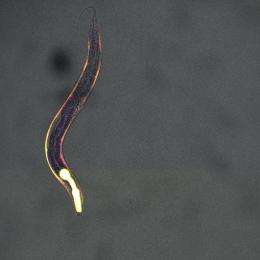Does presence of oxidants early in life help determine life span?

Why do we age, and what makes some of us live longer than others? For decades, researchers have been trying to answer these questions by elucidating the molecular causes of aging.
One of the most popular theories is that the accumulation of oxygen radicals over time might be the underlying culprit in aging. Oxygen radicals are chemically reactive molecules that can damage cellular components such as lipids, proteins and nucleic acids, resulting in "oxidative stress."
The possible link between oxidative stress and aging has led to the proliferation of antioxidant products ranging from dietary supplements to anti-aging creams. However, the role of oxidative stress in aging is still controversial, and the effectiveness of these antioxidants is debatable.
In a paper to be published online July 19 in the journal Molecular Cell, University of Michigan molecular biologist Ursula Jakob and her co-workers measured reactive oxygen species in worms and identified the processes affected by oxidative stress.
Using the small roundworm C. elegans, a popular model organism for aging studies, they made several surprising observations. They found that these animals are forced to deal with very high levels of reactive oxygen species long before old age. High levels of reactive oxygen were found to accumulate during early development (i.e., the childhood of the worm).
Once these worms reached adulthood the levels of reactive oxygen declined, only to surge again later in life. Intriguingly, mutant worm variants that were destined to live a very long time were able to cope much better with reactive oxygen and recovered earlier than short-lived variants.
This finding suggests that the ability to deal with and recover from early oxidative stress might be a harbinger of the lifespan of the animals, according to the U-M researchers.
"We fully expected to see increased levels of reactive oxygen species in older animals, but the observation that very young animals transiently produce these very high levels of oxidants came truly as a big surprise," said Daniela Knoefler, a doctoral candidate in Jakob's lab and one of the lead authors of the study.
"Of course, we have no idea whether this is also the case in humans," said Jakob, a professor in the Department of Molecular, Cellular and Developmental Biology in the College of Literature, Science, and the Arts and a professor in the Department of Biological Chemistry at the Medical School.
"However, there are some convincing studies conducted in mice which show that manipulating metabolism in the first few weeks of life can produce a substantial slowing of the aging process and increase in life span," Jakob said.
Now, the search is on to discover the mechanism behind this early oxidant accumulation and the fascinating possibility that by manipulating these levels of reactive oxygen early in life, researchers could potentially affect the lifespan of the organisms, Jakob said.














